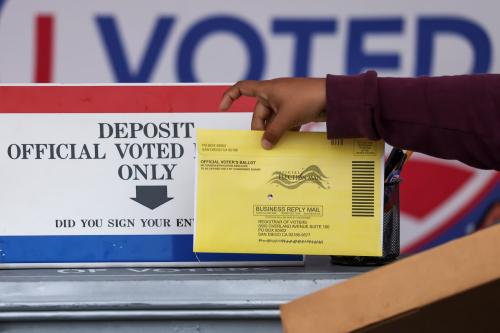In my new Center for Effective Public Management paper, “The administrative state’s legitimacy crisis,” I argue that Americans’ anxieties about our sprawling, largely impenetrable bureaucracy pose a major challenge to the effective working of our government. This work is largely critical in orientation, contending that technocratic defenses of our current arrangements are complacent about citizens’ sense of alienation while at the same time insisting that populists’ efforts to simply shake free of the administrative state produce only more disappointment and cynicism. I try to sketch out a sensible middle way that values coping, competence, and compromise and functions through intermediation and incrementalism.
When it comes to the institutional reforms these values might imply, I offer four broad types: localism when possible, greater administrative state attention to justification, exposing agencies to better and more reliable scrutiny, and building congressional capacity. Why should the last of these, directed at the legislature, be thought of as fundamentally responsive to the administrative state’s legitimacy crisis?
It is because intermediation between citizens and government is vital to legitimating the administrative state’s work. Self-government is a mere fantasy if it means that citizens are supposed to actively and knowledgeably generate policy choices across the whole spectrum of federal policy—and this isn’t because they are poorly educated, or apathetic. Our government embodies an extensive division of labor that makes it impossible for even the most knowledgeable to have a clear grasp of most issues. It is almost entirely nonsensical to think of the public as having well-formed views that could somehow be immediately realized.
For self-government to be a meaningful ideal, it must work through some process of intermediation, in which citizens’ concerns are absorbed and transmitted by some kind of trusted representative. Legislators, who must hustle for votes in their communities, are naturally suited for this work, but our Congress has gotten worse at it in recent decades. Information about citizen needs is not so much as absorbed and transmitted into open-ended political dealing as it is occasionally picked up and weaponized for zero-sum ideological sparring.
That is perhaps mild hyperbole, but the situation is plenty dire. In 2015, Gallup registered a remarkably low eight percent saying they trust Congress “a great deal” or “quite a lot”—scarcely more than the five percent who volunteered the answer “none.” Whereas successful intermediation produces a sense that the outcomes of the system should be accepted even when they seem unfavorable, when Congress manages to effectively steer policy today you almost get the sense that it makes the legitimacy problem worse. Denizens of the executive branch may well begin to think that they are better off openly circumventing Congress and appealing directly to the public to justify their work—but because of the conflict that creates with our constitutional framework, because Congress cannot be simply wished away, that is unlikely to be effective.
We find ourselves, then, in a difficult position: Congress needs to be made to do the work of an effective intermediary institution, but it shows little sign of being either willing or able to do so.
Whether or not there is much hope on this front, I am far from the only one angling for a strengthening of Congress leading to better democratic accountability and ultimately legitimacy for the administrative state. There is a good deal of Congress-oriented ferment among those concerned about the inadequacy of our current arrangements on both sides of the political aisle. Notable efforts include:
- Lee Drutman and Steve Teles’ reform agenda emphasizing the need for Congress to strengthen its own analytical capabilities in order to be less reliant on information provided by corporate lobbyists. In my terms, to strengthen its ability to function as a trusted intermediary.
- Senator Mike Lee’s (R – UT) Article I Project, which brings together a number of conservative lawmakers to attempt to revive legislators’ own sense of their institutional prerogatives, and focuses especially on Congress’s inability to effectively oversee the work of the executive.
- Various regulatory reform proposals that would seek to bolster Congress’s abilities and opportunities to independently evaluate regulations.
- The newly formed Legislative Branch Capacity working group, formed by Drutman and Kevin Kosar, which seeks to operate as a central hub for this kind of thinking, and has urged congressional leadership to form a Joint Committee on the Capacity of Congress.
Tackling the problems of the administrative state via rebuilding congressional capacity is unlikely to be the most effective political rallying cry ever devised: it is far easier and more emotionally satisfying to simply call for throwing the whole thing overboard, as with Ted Cruz’s call to disband the IRS. But the road to effective and legitimate government almost certainly runs through these parts.
The Brookings Institution is committed to quality, independence, and impact.
We are supported by a diverse array of funders. In line with our values and policies, each Brookings publication represents the sole views of its author(s).




Commentary
The administrative state faces a legitimacy crisis: So fix Congress!?
April 20, 2016